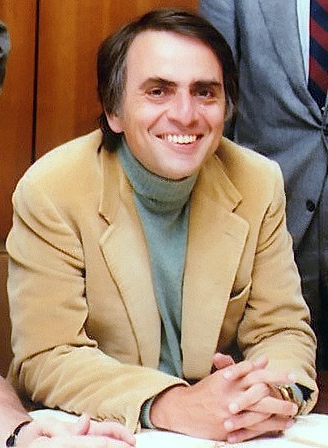Carl Sagan citáty a výroky
Carl Sagan: Citáty v angličtine
33 min 20 sec
Zdroj: Cosmos: A Personal Voyage (1990 Update), Heaven and Hell [Episode 4]
Kontext: There are many hypotheses in science that are wrong. That's perfectly alright; it's the aperture to finding out what's right. Science is a self-correcting process. To be accepted, new ideas must survive the most rigorous standards of evidence and scrutiny.
Kontext: There are many hypotheses in science that are wrong. That's perfectly alright; it's the aperture to finding out what's right. Science is a self-correcting process. To be accepted, new ideas must survive the most rigorous standards of evidence and scrutiny. The worst aspect of the Velikovsky affair is not that many of his ideas were wrong or silly or in gross contradiction to the facts; rather, the worst aspect is that some scientists attempted to suppress Velikovsky's ideas. The suppression of uncomfortable ideas may be common in religion or in politics, but it is not the path to knowledge and there is no place for it in the endeavor of science. We do not know beforehand where fundamental insights will arise from about our mysterious and lovely solar system, and the history of our study of the solar system shows clearly that accepted and conventional ideas are often wrong and that fundamental insights can arise from the most unexpected sources.
Zdroj: The Varieties of Scientific Experience: A Personal View of the Search for God (2006)
“Science is only a Latin word for knowledge”
Zdroj: The Varieties of Scientific Experience: A Personal View of the Search for God
Zdroj: Dragons of Eden: Speculations on the Evolution of Human Intelligence
Zdroj: The Varieties of Scientific Experience: A Personal View of the Search for God
“Their position seems to be that their God is so great he doesn't even have to exist.”
Zdroj: Contact
In Wonder and Skepticism, Skeptical Enquirer (Jan-Feb 1995), 19, No. 1.
The Varieties of Scientific Experience: A Personal View of the Search for God (2006)
The Varieties of Scientific Experience: A Personal View of the Search for God (2006)
“If we crave some cosmic purpose, then let us find ourselves a worthy goal.”
Pale Blue Dot: A Vision of the Human Future in Space (1994)
The Varieties of Scientific Experience: A Personal View of the Search for God (2006)
The Varieties of Scientific Experience: A Personal View of the Search for God (2006)
The Varieties of Scientific Experience: A Personal View of the Search for God (2006)
The Varieties of Scientific Experience: A Personal View of the Search for God (2006)
Zdroj: The Demon-Haunted World : Science as a Candle in the Dark (1995), Ch. 2 : Science and Hope, p. 30
Zdroj: The Demon-Haunted World : Science as a Candle in the Dark (1995), Ch. 2 : Science and Hope, p. 25
"Why We Need To Understand Science" in The Skeptical Inquirer Vol. 14, Issue 3 (Spring 1990)
Kontext: I know that science and technology are not just cornucopias pouring good deeds out into the world. Scientists not only conceived nuclear weapons; they also took political leaders by the lapels, arguing that their nation — whichever it happened to be — had to have one first. … There’s a reason people are nervous about science and technology.
And so the image of the mad scientist haunts our world—from Dr. Faust to Dr. Frankenstein to Dr. Strangelove to the white-coated loonies of Saturday morning children’s television. (All this doesn’t inspire budding scientists.) But there’s no way back. We can’t just conclude that science puts too much power into the hands of morally feeble technologists or corrupt, power-crazed politicians and decide to get rid of it. Advances in medicine and agriculture have saved more lives than have been lost in all the wars in history. Advances in transportation, communication, and entertainment have transformed the world. The sword of science is double-edged. Rather, its awesome power forces on all of us, including politicians, a new responsibility — more attention to the long-term consequences of technology, a global and transgenerational perspective, an incentive to avoid easy appeals to nationalism and chauvinism. Mistakes are becoming too expensive.
25 Min 10 Sec
Cosmos: A Personal Voyage (1990 Update), Who Speaks for Earth? [Episode 13]
Zdroj: Pale Blue Dot: A Vision of the Human Future in Space (1994), p. 395
Smithsonian magazine, May 1978, pp. 43, 44. Quoted in Awake! magazine, 1978, 8/22.
